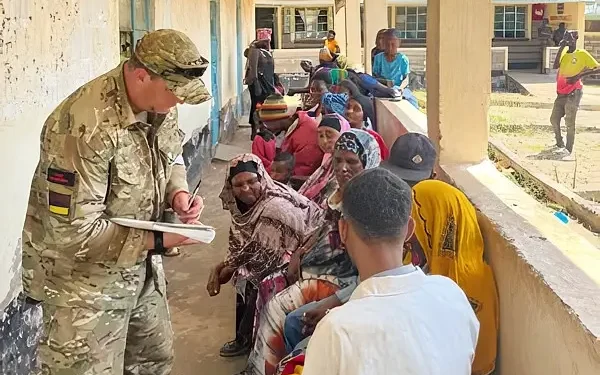Over 17,000 residents in the remote areas of Isiolo and Laikipia counties, Kenya, received vital medical treatment from the British Army, partnering with the Kenya Defence Forces (KDF) and local hospitals.
This initiative, part of the British Army Training Unit in Kenya (BATUK), reflects the military’s commitment to both training and humanitarian efforts.
Lifesaving Care for Remote Communities
The British Army, alongside KDF medics, provided free healthcare to underserved communities where access to medical services is often limited. Over a five-week period, the two forces set up clinics in 11 locations, some of which had not seen such services in years.
This was part of Exercise HARAKA SERPENT, a joint medical outreach that combined military precision with healthcare delivery.
The 215 Medical Regiment from the UK worked tirelessly with their Kenyan counterparts to provide a range of treatments. Local hospitals such as Isiolo County Referral Hospital and NGOs like Beyond Zero also joined forces, making the outreach even more effective.
According to Colonel Edd Gordon, Commanding Officer of the British Medical Regiment,
“Delivering healthcare to such a diverse range of patients is of enormous benefit to our soldiers and it’s great to also give something back to the local community.”
Health Services Delivered
The clinics offered an array of services aimed at addressing both immediate medical needs and preventative care:
- General health checks to identify underlying conditions
- Ophthalmology services for those needing eye exams and glasses
- Dental care, an essential service in areas where dental health is often neglected
- Nutritional monitoring for children and vulnerable groups
- Health education to empower communities with basic knowledge on hygiene and disease prevention
Additionally, over 5,000 of the 17,000 patients required immediate treatment, including 614 children under the age of five. These interventions made a profound impact on residents, many of whom had never seen a doctor before.
Military Collaboration for Humanitarian Impact
The partnership between the British Army and KDF didn’t just focus on immediate healthcare—it also emphasised long-term knowledge sharing. Medical teams compared techniques, shared field experience, and explored ways to adapt their military medical training for use in humanitarian settings.
British High Commission Defence Advisor, Brigadier Olly Bryant, said,
“Our militaries train and operate together not only to fight terrorism but also to share expertise, experience and techniques.”
This collaboration strengthens the operational effectiveness of both forces while enhancing the healthcare infrastructure for communities near BATUK training areas.
Services Provided During the Outreach |
Number of Beneficiaries |
|---|---|
| General Health Checks | 10,000+ |
| Ophthalmology Services | 2,000+ |
| Dental Treatment | 1,500+ |
| Nutritional Support | 500+ |
| Children Under Five Treated | 614 |
Long-Term Benefits
In regions like Isiolo and Laikipia, where medical facilities are often too far away or under-resourced, this joint initiative provided much-needed care. More importantly, it brought a lasting impact by fostering greater health awareness and empowering local healthcare systems.
For those involved in the medical outreach, the opportunity to serve was mutually beneficial. Soldiers gained hands-on experience in delivering medical aid in challenging environments, preparing them for future humanitarian missions.
On the ground, residents benefited not only from the immediate care provided but also from the education and resources shared by the medical teams.
The success of Exercise HARAKA SERPENT is a testament to the shared mission between the UK and Kenya’s military forces to support and uplift local communities.
A Bright Future for Military Humanitarianism
As the British Army and KDF continue to collaborate, future efforts will likely expand into more areas, offering services that address the most pressing needs of vulnerable populations.
The outreach reflects a deepening relationship between the two nations, with the military not only serving its core security objectives but also contributing significantly to public health in remote regions.
In a world where healthcare inequality remains a significant challenge, such initiatives demonstrate that military forces can extend their role beyond defence, offering a lifeline to those in need.
Sources: THX News & British High Commission Nairobi.









